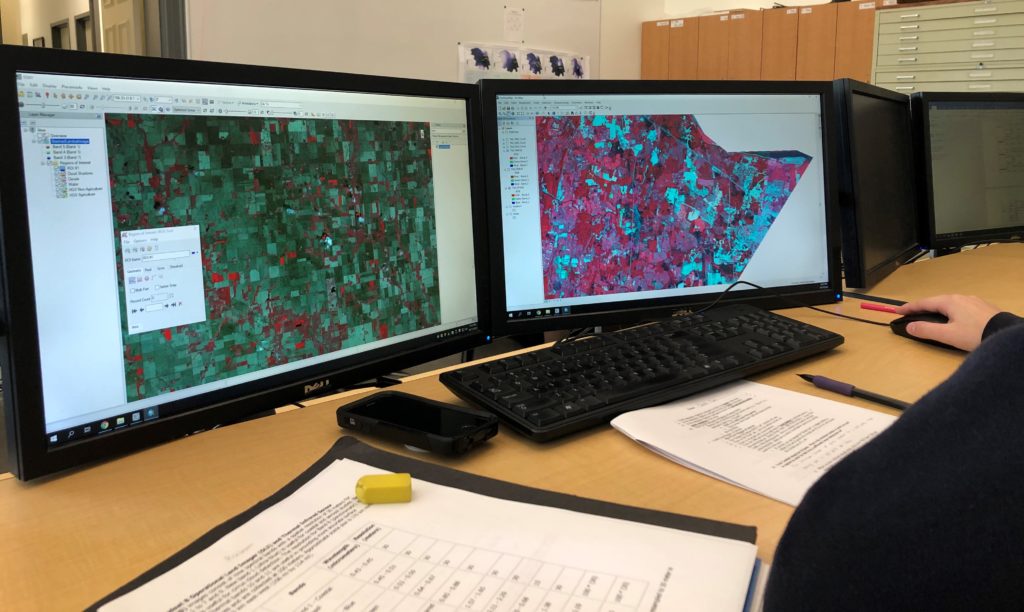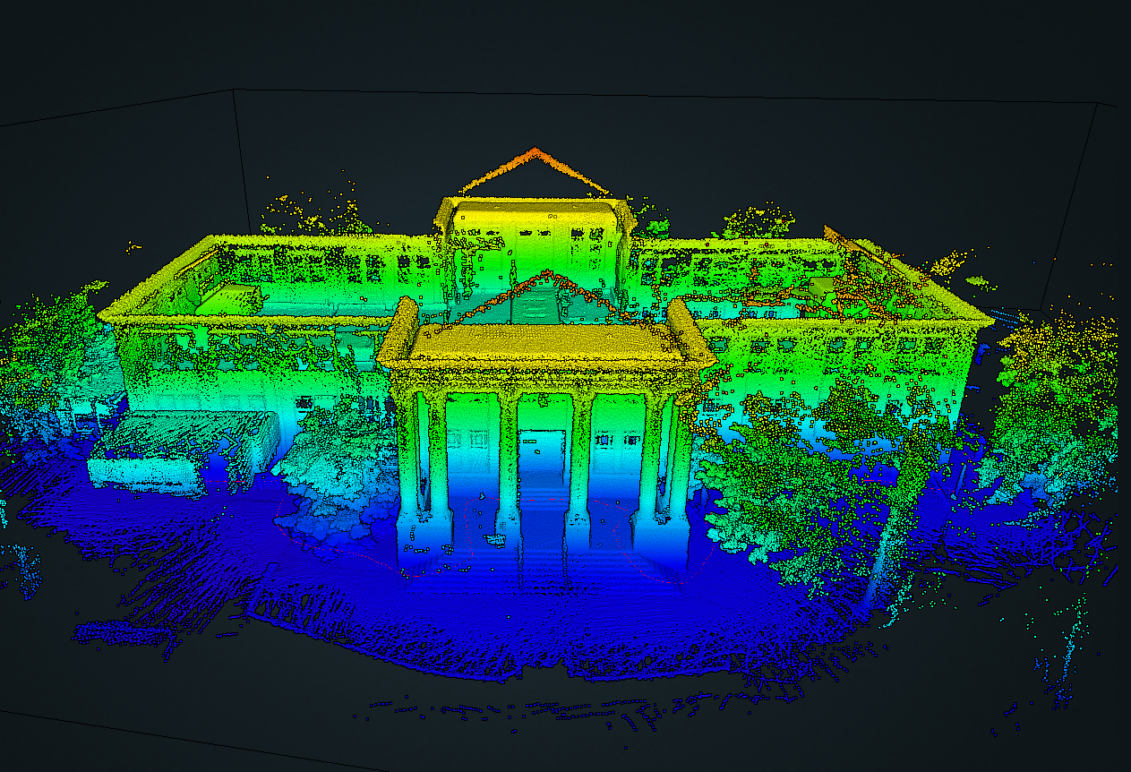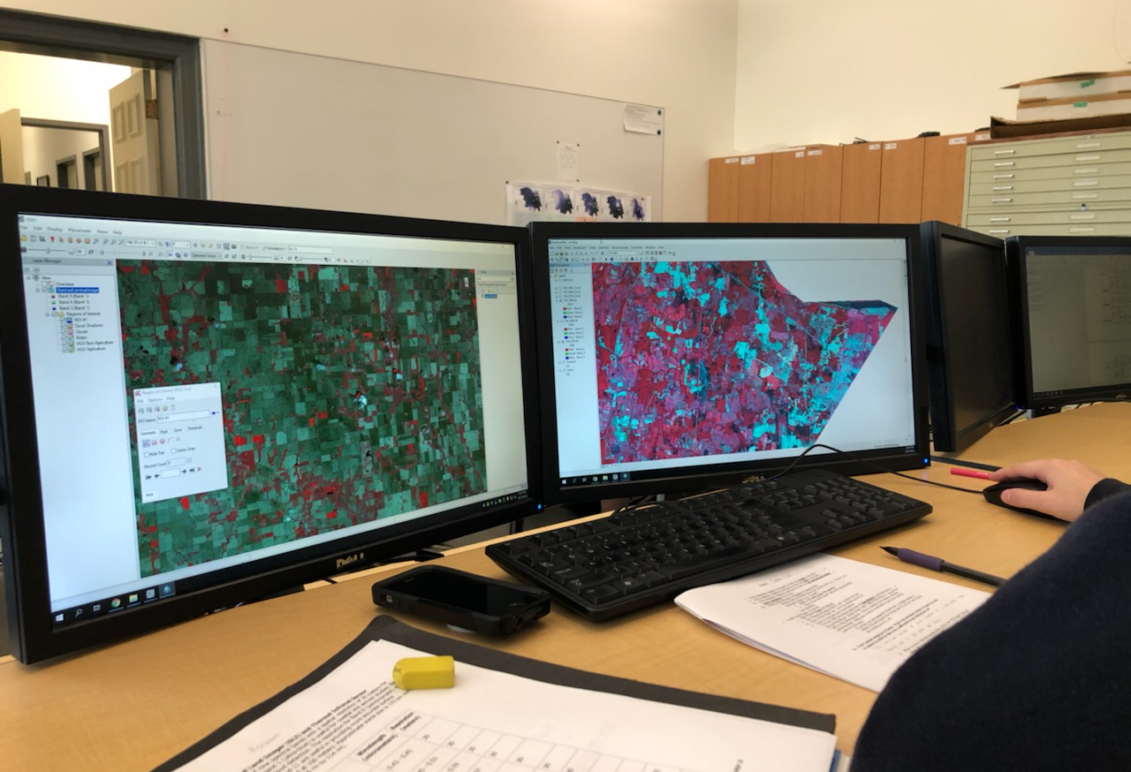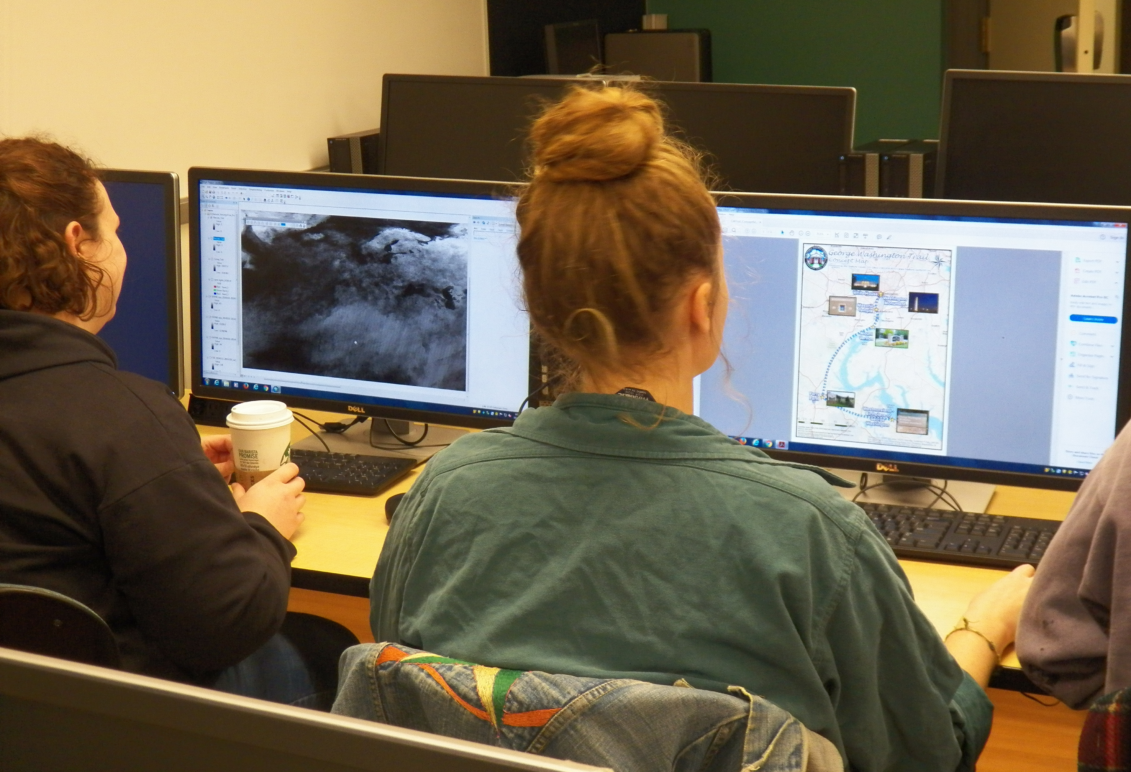While UMW doesn’t offer a bachelor’s degree specifically in education, the University’s College of Education does offer, as electives towards a bachelor’s degree in another declared major, courses that will prepare you to meet the requirements for teacher licensure.
Majors
Geospatial Analysis
Geospatial Analysis
Geospatial analysis is mapping, but so much more.
Collect, organize, and analyze data that explains where things were, are, or could be. Build a deep understanding of a spatial dataset, model relationships with environmental conditions, predict future changes. Visualize your results in a GIS, a map, a 3-D animation, or a web app. Geospatial analysis is one of the most important majors you’ve never heard of!
Areas of Study
Spatial information is used every day by ordinary people, in Google Maps, Waze, tracking a flight, or tagging a photo. An abundance of geospatial data is collected by government agencies, non-profits and private companies. Much of it is freely available and can be used to explore and analyze geospatial questions. Geospatial analysis majors are interested in geography, information technology, visualization, and problem-solving. They use satellite and air-photo data, spatial statistics, the global positioning system, and GIS programming. Students tailor their interests to one or more areas in geography, such as planning, economic development, or environmental studies. Majors are also encouraged to engage in internships, study abroad programs, and undergraduate research.
How can I learn outside of class?
Students commonly intern with local governments, in departments focused on GIS, planning or utilities. Many UMW students hold internships with the National Geospatial Intelligence Agency (NGA) or its contractors, as well as with ESRI, the company producing software used in our teaching program. State and federal agencies, branches of the military, and non-profit organizations also use GIS and regularly host interns. Research projects with faculty are common, involving field mapping, production of online and printed maps and story maps.
What can I do with a degree in geospatial analysis?
The University of Mary Washington is located near the largest job market in the US for geospatial careers. Employers include federal intelligence and environmental agencies, state environmental and conservation bodies, and organizations focused on planning, sustainability, and the development of GIS software. Alumni of the Department of Geography at UMW can be found at all levels and regularly mentor current students.
To graduate with departmental honors, you must be a declared geography major by the beginning of your senior year. You must have a grade-point average of 3.5 in major courses and a 3.0 grade point average overall at the beginning of the second semester of your senior year. In consultation with an advisor, you’ll propose, research, and write a thesis. You’ll defend it before a committee, which determines whether it merits departmental honors.
Students completing a major in geospatial analysis earn the degree of Bachelor of Arts (B.A.) in geography. The major requires at least 41 credits, including core and foundation courses, one course from each of three areas for breadth in geography, plus three upper-level courses and a senior seminar.
To graduate with departmental honors, you must be a declared geography major by the beginning of your senior year. You must have a grade-point average of 3.5 in major courses and a 3.0 grade point average overall at the beginning of the second semester of your senior year. In consultation with an advisor, you’ll propose, research, and write a thesis. You’ll defend it before a committee, which determines whether it merits departmental honors.
Latin
Latin
Don’t call it dead.
Latin lives today, transformed into languages spoken by millions. The universal donor of modern languages, Latin provides words we use today in medicine, law, philosophy, theology, and the sciences. Major in Latin at the University of Mary Washington and you’ll immerse yourself in the language of the Romans and the literature, poetry, and ideas foundational to Western culture. Informed by the ancients, you’ll prepare yourself to help shape the future.
Degree Awarded
Students majoring in classics who complete all requirements earn the degree of Bachelor of Arts (B.A.) in classics.
Areas of Study
Major in Latin at UMW and you’ll choose from courses including elementary, intermediate, and advanced Latin language; survey courses in Latin literature; Roman drama; lyric and elegiac poetry; the writings of Roman historians; the works of Vergil, Horace, and Ovid; Roman philosophical thought; Roman satire; and more.
Classics offerings include Greek and Roman ideas and culture; Greek and Roman mythology in art and literature; the dramas of Aeschylus, Sophocles, and Euripides; epic traditions; Greek and Roman religion; Egyptian and Near Eastern art and archaeology; women in antiquity; the ancient city; and Greek and Roman archaeology.
Career Opportunities
A background in Latin or classics gives graduates a wide range of opportunities after college, including museum work, archaeology, graduate study, teaching, and translating. A classics major is also excellent preparation for the LSAT and law school.
Internships
Latin and classics majors have opportunities to conduct research and present their findings, to seek for-credit or paid internships, and to study abroad.
To earn honors in classics, you’ll need a GPA of at least 3.5 in the major and 3.2 overall. You’ll research, write, and defend a thesis and complete an exit interview.
Major Requirements
Students seeking a classics major can choose from concentrations in classical civilization (often paired with teaching licensure) or classical archaeology (preparation for museum or field work). Either concentration requires 33 credits in core and elective courses, including courses at the 300 level or higher.
Students seeking a Latin major will need 33 credits in core courses and electives, including at least 15 credits in Latin courses beyond the intermediate level and at least nine credits in approved courses relating to classical civilization.
Minor Requirements
Classics offers a museum studies minor, which requires 18 credits including core and elective courses.
Students who major in Latin and the classics can apply for several scholarships and awards through the Department of Classics, Philosophy, and Religion.
Classics
Classics
To understand today’s world, look back – way back.
The ideas of ancient Greece, Rome, and Egypt still resonate throughout modern life. Study the languages, literatures, arts, and civilizations of the ancients to gain a deeper understanding of today’s multicultural world. You’ll gain critical thinking and communications skills that open up careers – in education, museums, translation, archaeology, law and more.
Degree Awarded
Students majoring in Classics who complete all requirements earn the degree of Bachelor of Arts (B.A.) in Classics.
Areas of Study
Students can major in one or more of four different concentrations in Classics: Classical Archaeology, Classical Civilization, Classics: Ancient Mediterranean Studies, and Classics: Latin.
Major in Latin at UMW and you’ll choose from courses including elementary, intermediate, and advanced Latin language; survey courses in Latin literature; Roman drama; lyric and elegiac poetry; the writings of Roman historians; the works of Vergil, Horace, and Ovid; Roman philosophical thought; Roman satire; and more.
Classics offerings include Greek and Roman ideas and culture; Greek and Roman mythology in art and literature; the dramas of Aeschylus, Sophocles, and Euripides; epic traditions; Greek and Roman religion; Egyptian and Near Eastern art and archaeology; women in antiquity; the ancient city; and Greek and Roman archaeology.
Career Opportunities
A background in Latin or classics gives graduates a wide range of opportunities after college, including museum work, archaeology, graduate study, teaching, and translating. A classics major is also excellent preparation for the LSAT and law school.
Internships
Latin and classics majors have opportunities to conduct research and present their findings, to seek for-credit or paid internships, and to study abroad.
To earn honors in classics, you’ll need a GPA of at least 3.5 in the major and 3.2 overall. You’ll research, write, and defend a thesis and complete an exit interview.
Major Requirements
Students seeking a classics major can choose from concentrations in classical civilization (often paired with teaching licensure) or classical archaeology (preparation for museum or field work). Either concentration requires 33 credits in core and elective courses, including courses at the 300 level or higher.
Students seeking a Latin major will need 33 credits in core courses and electives, including at least 15 credits in Latin courses beyond the intermediate level and at least nine credits in approved courses relating to classical civilization.
Minor Requirements
Classics offers a museum studies minor, which requires 18 credits including core and elective courses.
Students who major in Latin and the classics can apply for several scholarships and awards through the Department of Classics, Philosophy, and Religion.
Communication and Digital Studies
Communication and Digital Studies
Communication is in constant motion.
Major in communication and digital studies at the University of Mary Washington, and you’ll become adept at sharing ideas across communication platforms. Whether you’re exploring games and culture, video art, social media or graphic novels, you’ll control your own digital identity as you learn to create powerful messaging to meet tomorrow’s challenges.
Degree Awarded
Students majoring in communication and digital studies who complete all requirements earn the degree of Bachelor of Arts (B.A.) in Communication and Digital Studies.
Areas of Study
Pair core courses in communication and digital studies with a range of electives, including Introduction to Film Studies; Games and Culture; Approaches to Video Art; Social Media; the Graphic Novel; and History of the Information Age.

Career Opportunities
This innovative bachelor’s program will prepare you for a career in advertising, marketing, communications law, and much more. Whatever you choose to pursue, you’ll develop the skills today’s employers are looking for.

The communication and digital studies major requires 36 credits in two core groups – 15 credits in communication, 9 credits in digital studies – and 12 elective credits.



